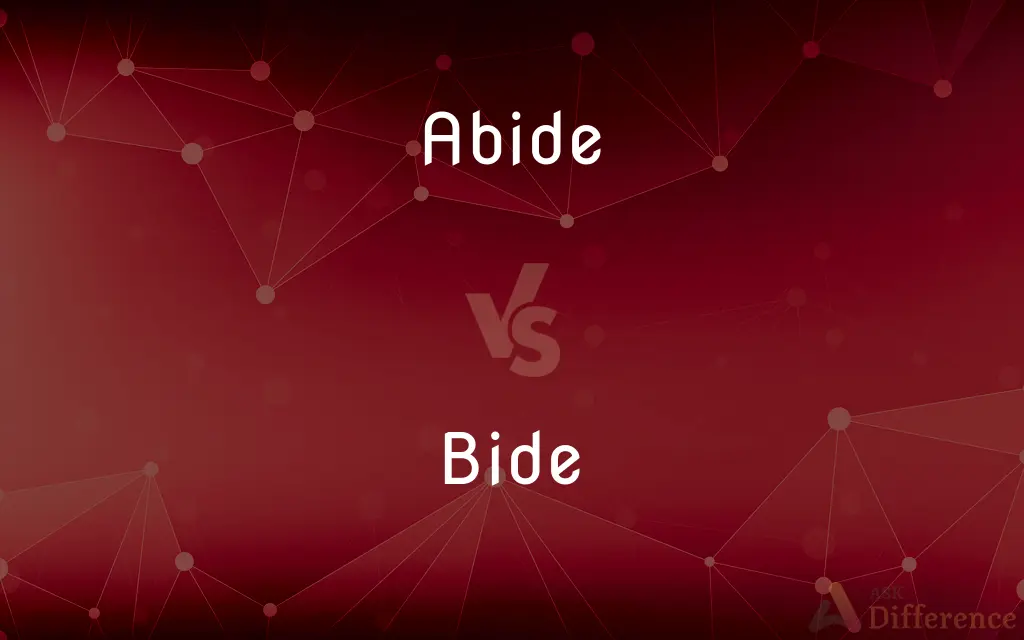Abide vs. Bide — What's the Difference?
By Maham Liaqat & Urooj Arif — Updated on March 28, 2024
Abide means to accept or follow a rule or decision, while bide refers to waiting patiently for the right moment or opportunity.

Difference Between Abide and Bide
Table of Contents
ADVERTISEMENT
Key Differences
Abide primarily connotes adherence to rules, decisions, or conditions, emphasizing compliance and acceptance. Individuals are expected to abide by laws and guidelines, showing respect for established norms. On the other hand, bide is associated with waiting, often implying patience and the passage of time. It suggests remaining in a situation or state until an anticipated event occurs or conditions change. This contrast highlights actions oriented towards compliance versus patience.
While "abide" can also mean to tolerate or endure something, indicating a level of persistence or stoicism in the face of adversity, "bide" suggests a strategic or hopeful waiting. For instance, one might abide discomfort or hardship, whereas to bide one's time suggests an element of planning or anticipation for an opportune moment. This difference underscores the active acceptance versus the passive waiting inherent in each term.
Historically, both words have roots in Old English, reflecting their long-standing use in the language. "Abide" has evolved to encompass emotional endurance and residence in addition to compliance, whereas "bide" has retained a more focused meaning related to waiting. This historical context enriches our understanding of their modern usage, indicating a divergence in meaning despite similar origins.
The phrases "abide by" and "bide your time" exemplify the practical application of each term. To "abide by" something (like rules or decisions) calls for active adherence, while to "bide your time" suggests a strategic pause, waiting for a favorable situation to arise. These expressions illustrate the behavioral and situational differences invoked by each verb.
In contemporary usage, "abide" often appears in legal and formal contexts, underscoring the importance of compliance and adherence to specific standards or rules. Conversely, "bide" is more commonly used in literary or narrative contexts, evoking a sense of anticipation or strategic planning. This distinction points to the different spheres of life and types of action each word is most associated with, reflecting their varied applications and connotations.
ADVERTISEMENT
Comparison Chart
Primary Meaning
To accept or follow a rule or decision
To wait patiently for the right moment
Additional Meanings
To tolerate or endure
-
Usage Context
Legal, formal, and everyday contexts
Literary, narrative, and strategic contexts
Connotation
Compliance, persistence, and tolerance
Patience, anticipation, and strategic waiting
Example Phrases
Abide by the law, abide by a decision
Bide one's time, -
Compare with Definitions
Abide
To follow or adhere to rules or guidelines.
Citizens are expected to abide by local laws to maintain order.
Bide
To remain in a condition or state.
Bide in peace until the storm passes.
Abide
To tolerate or endure a situation.
He couldn't abide the noise from the construction site.
Bide
To wait for a favorable opportunity.
He decided to bide his time before asking for a promotion.
Abide
To continue to remain; to last.
His legacy will abide long after he is gone.
Bide
To endure an unfavorable situation.
We'll just have to bide the inconvenience for a while.
Abide
To remain in a place; to dwell.
She abides in the countryside for its tranquility.
Bide
To wait; tarry.
Abide
To accept without objection.
You must abide the committee's decision with grace.
Bide
To stay
Bide at home.
Abide
To put up with; tolerate
Can't abide such incompetence.
Bide
To be left; remain.
Abide
To wait patiently for
"I will abide the coming of my lord" (Tennyson).
Bide
Past tense bided To await; wait for.
Abide
To remain in a place
"I'll call upon you straight. Abide within" (Shakespeare).
Bide
To bear; to endure; to tolerate.
Abide
To continue in existence; endure
"I have decided my life can't be about absence, what I don't have, what does not abide, and the rich grief it brings" (Amy Benson).
Bide
To face with resistance; to encounter; to withstand.
Abide
To dwell or reside.
Bide
To dwell or reside in a location; to abide.
Abide
(transitive) To endure without yielding; to withstand.
The old oak tree abides the wind endlessly.
Bide
To wait; to be in expectation; to stay; to remain.
Abide
(transitive) To bear patiently.
Bide
To wait for; to await.
Abide
(transitive) To pay for; to stand the consequences of.
Bide
To dwell; to inhabit; to abide; to stay.
All knees to thee shall bow of them that bideIn heaven or earth, or under earth, in hell.
Abide
To wait in expectation.
Bide
To wait for; as, I bide my time. See Abide.
Abide
To pause; to delay.
Bide
Dwell;
You can stay with me while you are in town
Stay a bit longer--the day is still young
Abide
To stay; to continue in a place; to remain stable or fixed in some state or condition; to be left.
Abide
To have one's abode.
Abide
To endure; to remain; to last.
Abide
To stand ready for; to await for someone; watch for.
Abide
To endure or undergo a hard trial or a task; to stand up under.
Abide
To await submissively; accept without question; submit to.
Abide
To wait; to pause; to delay.
Abide
To stay; to continue in a place; to have one's abode; to dwell; to sojourn; - with with before a person, and commonly with at or in before a place.
Let the damsel abide with us a few days.
Abide
To remain stable or fixed in some state or condition; to continue; to remain.
Let every man abide in the same calling.
The poor fellow was obstinate enough to abide by what he said at first.
Abide
To wait for; to be prepared for; to await; to watch for; as, I abide my time.
Bonds and afflictions abide me.
Abide
To endure; to sustain; to submit to.
[Thou] shalt abide her judgment on it.
Abide
To bear patiently; to tolerate; to put up with.
She could not abide Master Shallow.
Abide
To stand the consequences of; to answer for; to suffer for.
Dearly I abide that boast so vain.
Abide
Dwell;
You can stay with me while you are in town
Stay a bit longer--the day is still young
Abide
Put up with something or somebody unpleasant;
I cannot bear his constant criticism
The new secretary had to endure a lot of unprofessional remarks
He learned to tolerate the heat
She stuck out two years in a miserable marriage
Common Curiosities
Can "abide" be used in a personal context?
Yes, "abide" can be used in a personal context to express tolerance or endurance of certain conditions or behaviors.
What does it mean to abide by something?
To abide by something means to follow or adhere to specific rules, guidelines, or decisions.
How do "abide" and "bide" differ in their application?
"Abide" is often used in the context of compliance and endurance, while "bide" is typically used in the context of waiting or planning for an opportune moment.
Are there modern synonyms for "bide"?
Modern synonyms for "bide" include wait, linger, or hold off, though "bide" carries a more nuanced connotation of strategic patience.
What does "bide your time" mean?
"Bide your time" means to wait patiently for the right moment or opportunity to act.
Can "abide" have a positive connotation?
Yes, "abide" can have a positive connotation when it refers to adherence to positive principles or enduring challenges with strength.
Is "bide" still commonly used today?
"Bide" is less commonly used in everyday conversation but remains familiar in literary or strategic contexts.
Is waiting an aspect of abiding?
While waiting can be an aspect of abiding, especially in terms of enduring, "abide" more directly emphasizes compliance and tolerance rather than the act of waiting.
Can "abide" be used interchangeably with "obey"?
"Abide" and "obey" are similar but not always interchangeable, as "abide" can also imply tolerance and endurance, not just obedience.
Does "bide" imply inaction?
"Bide" implies a deliberate choice to wait for the right moment, so it's more about strategic patience than inaction.
Share Your Discovery

Previous Comparison
Tornado vs. Whirlwind
Next Comparison
Church vs. ReligionAuthor Spotlight
Written by
Maham LiaqatCo-written by
Urooj ArifUrooj is a skilled content writer at Ask Difference, known for her exceptional ability to simplify complex topics into engaging and informative content. With a passion for research and a flair for clear, concise writing, she consistently delivers articles that resonate with our diverse audience.














































